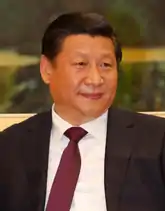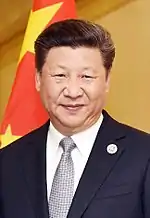2015 Xi–Chu meeting
On May 4, 2015, General Secretary of the Communist Party of China (CPC) Xi Jinping and Kuomintang (KMT) Chairman Eric Chu met in Beijing.


Background
After Xi Jinping became the General Secretary of the Communist Party of China in November 2012, the KMT repeatedly proposed a potential meeting between Xi and Ma Ying-jeou, who served as Chairman of the Kuomintang from 2009 to 2014.[1] Nothing came of the plans until 2015, when Chu was elected KMT chair.
Timeline
Preparation
In January 2015, Eric Chu became the Chairman of the KMT. On March 11, 2015, Yang Wei-chung, the former KMT spokesman, was consulted about the Cross-Strait Economic, Trade and Culture Forum, but details of the discussion were not publicly disclosed.[2]
On April 12, 2015, Eric Chu confirmed that he would be attending the 10th Cross-Strait Economic, Trade and Culture Forum, which was to be held in Shanghai on May 2–3, 2015, but the Xi-Chu meeting was not yet confirmed.[3]
On April 24, 2015, Taiwan Affairs Office spokesman Ma Xiaoguang said that Chu and Xi would meet.[4]
Shanghai
On May 2, 2015, Eric Chu arrived at Shanghai Pudong International Airport and shook hands with the head of the Taiwan Affairs Office of the Communist Party of China Central Committee Zhang Zhijun.[5] That same day, Chu attended a Cross-Strait Economic, Trade and Culture Forum held in Shanghai. He shook hands with Yu Zhengsheng, the chairman of the National Committee of the Chinese People's Political Consultative Conference. At this forum, Chu mentioned the Asian Infrastructure Investment Bank, a regional development bank led by the Chinese Government. Also, Chu visited Fudan University and delivered a speech.[6][7]
Beijing
On May 4, 2015, Chu arrived in Beijing and met with Xi Jinping, the General Secretary of the Communist Party of China. Xi said that Mainland China and Taiwan should settle political differences through consultation of the "One China" policy.[8] Chu also said 1992 consensus could be expanded to the international realm.[9]
After meeting Xi, Chu delivered a speech at Peking University.[10]
Controversy
On May 4, 2015, the Associated Press reported on the Xi-Chu meeting. The report quoted Eric Chu as saying that his party supports "eventual unification". But the chair of the KMT's Culture and Communications Committee Yang Wei-chung said that the report was mistaken. After the KMT filed a complaint, the AP rescinded the report.[11]
References
- Cheng, Rita; Hsu, Elizabeth (4 November 2015). "Ma-Xi meeting should be applauded: ex-White House official". Central News Agency. Retrieved 4 November 2015.
- 国民党:国共两党已就第十届国共论坛初步协商 (in Chinese). qq.com. March 11, 2015. Retrieved April 25, 2015.
- 朱立倫將率團赴國共論壇 「習朱會」未有定案 (in Chinese). Sing Pao. April 13, 2015. Archived from the original on May 18, 2015. Retrieved April 25, 2015.
- 中央台办:国共两党领导人将在北京会面 (in Chinese). sina.com.cn. April 24, 2015. Retrieved April 25, 2015.
- "Eric Chu Arrives in Shanghai for Forum". China Radio International. May 2, 2015. Retrieved May 8, 2015.
- "KMT remains upbeat on getting role in new bank". The Standard. May 4, 2015. Archived from the original on May 18, 2015. Retrieved May 9, 2015.
- "KMT head Eric Chu meets CPPCC chief Yu Zhengsheng in Shanghai". Want China Times. May 3, 2015. Archived from the original on May 18, 2015. Retrieved May 9, 2015.
- "China's Xi Jinping and Taiwan's Eric Chu in high-level talks". BBC. May 4, 2015. Retrieved May 9, 2015.
- "Chu hopes to expand Taiwan's global role based on 1992 consensus". Focus Taiwan. May 4, 2015. Retrieved May 9, 2015.
- "Eric Chu attends discussion at Peking University in Beijing". China Central Television. May 5, 2015. Archived from the original on May 18, 2015. Retrieved May 9, 2015.
- "AP pulls claim of Chu's backing for unification after KMT complaint". Want China Times. May 6, 2015. Archived from the original on May 18, 2015. Retrieved May 9, 2015.


.svg.png.webp)